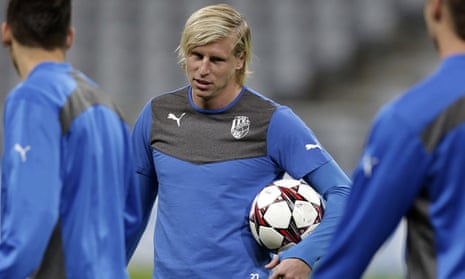The president of the Turkish side Gaziantepspor has confirmed reports that the Czech Republic international Frantisek Rajtoral killed himself at his home over the weekend, with the chief medical officer of international players’ union warning more needs to be done to combat mental illness among current professionals.
The 31-year-old, who played 14 times for his country and was part of the squad that reached the Euro 2012 quarter-finals, was found dead after Gaziantepspor alerted authorities to his absence on Sunday.
“Unfortunately I can confirm that the news of suicide is true,” Ibrahim Kizil told Turkish media outlet Sporx. “His team-mates were concerned after Rajtoral didn’t participate in today’s training session. He had good spirits, he didn’t seem to have any problem. I really don’t know why he did such a thing.”
The Czech Football Association expressed its “deepest condolences” to Rajtoral’s family, while his former club Viktoria Plzen released a statement paying tribute to their former player: “Rest in peace Rajt, we will all miss you so much, we will never forget you.”
According to a 2013 survey conducted by Vincent Gouttebarge, a former professional from France who is now chief medical officer for the international players’ union, FifPro, more than 10% of all deaths in professional football are attributed to suicide. That has led to several new initiatives designed to help combat the issue, including access to counsellors and the distribution of a handbook designed to explain the symptoms of common mental disorders.
“It’s always sad to hear that someone might have committed suicide. Every year we monitor deaths of current and retired players but of course it can be difficult to speculate on the cause of death,” Gouttebarge, who estimates they have distributed more than 10,000 of the guidebooks to 24 countries, told the Guardian.
“After a career, we are aware that retired players are likely to suffer from mental health problems because of the change from being an athlete to not being an athlete is not straightforward. If you are not well prepared for this second part of your life you are likely to experience some distress.”
Gouttebarge believes the death of the former Germany goalkeeper Robert Enke in 2009 was a major turning point in the fight against mental illness in football. FifPro is also trailing a new initiative after a study in the Netherlands called “After Career Consultation”, which concentrates on coping with five main areas post-retirement: the effect of the reduction of training, dealing with osteoarthritis (a common complaint among ex-players), developing a healthy lifestyle, mental health and education and career planning.
“In the last two years we have seen a huge change in the way this issue is seen,” he said. “We conducted several surveys to explore the extent of mental health problems and based on these findings we have tried to come up with some measures to help the players.
“Less than 1% of players are set up for life in financial terms by their careers, so the rest of them have to go out and find work. We are a union so money is always an issue but I think we are on the right track and I’m sure it will continue to get a better understanding as time goes on.”
In the UK, the Samaritans can be contacted on 116 123.
In the US, the National Suicide Prevention Hotline is 1-800-273-8255.
In Australia, the crisis support service Lifeline is on 13 11 14.
